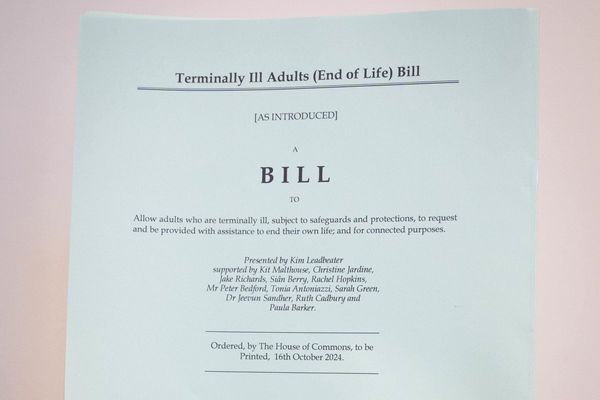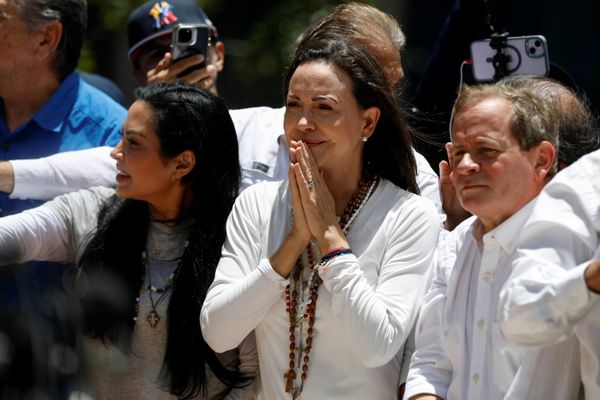WASHINGTON — Democrats seeking to sell President Joe Biden’s expansive economic agenda to the public are running into a persistent problem: voters who are deliberately tuning out politics.
Americans are typically not highly engaged with politics in the summer of a non-election year. But Democratic operatives say that levels of engagement with key members of their coalition are even lower than usual at this point, still exhausted after former President Donald Trump’s chaotic tenure and disheartened by enduring political divisiveness.
It’s a dynamic that Democrats say has made it difficult for their messages on Biden’s signature policies — including the pandemic relief, infrastructure and budget packages — to break through as they try to lay the groundwork ahead of a challenging midterm election cycle.
“What we find is people are checking out at record high levels because they feel everything is contentious, exhausting and divisive,” said Celinda Lake, a veteran Democratic pollster who worked on Biden’s 2020 presidential campaign. “It speaks to what a steep hill we’re climbing.”
Lake said she is seeing lingering political fatigue particularly among swing women voters and irregular Democratic-leaning voters, including younger and Black Americans, groups that were critical to Biden’s 2020 victory.
She said the degree to which these voters are now intentionally checking out of politics is a “brand new phenomenon” that is presenting unique hurdles for Democrats. The party is planning to make Biden’s economic agenda a cornerstone of its campaign to maintain control of the U.S. House and Senate next year.
“We know how to deal with benign neglect,” Lake said. “But now with a more deliberate strategy, when we need people to feel engaged, it is much more dangerous.”
To some Democrats, it’s a natural outcome of the 2020 campaign, when Biden promised to deliver a respite to voters who were weary of the seemingly constant and unpredictable Trump-driven news cycles. “You won’t have to worry about my tweets when I’m president,” Biden tweeted last summer.
Roshni Nedungadi, a Democratic pollster, has conducted focus groups with Black and younger voters across the country throughout the year. She said these voters thought they always had to be connected to the news and social media during the Trump era.
Now with Biden, whom they rate highly, they are taking a step back from politics, which also makes them less aware of the president’s plans.
“We’re seeing the same reactions every time we ask what’s going on in politics. It’s very much, ‘I don’t know, I’m not paying attention right now,’” Nedungadi said. “People are saying if they scroll across something, they’re really deliberately ignoring it and moving on.”
And on top of a general disillusionment with politics, Americans across the board are still navigating a disruptive pandemic that has continued to overshadow most other political issues.
“People are trying to sort out their own lives rather than sort out the nation’s business, and that makes it much tougher to move an agenda forward,” said longtime Democratic pollster Peter Hart. “It’s not so much the administration is making mistakes as it is the sign of the times.”
Democrats’ economic case
Even though the midterm elections are more than 14 months away, Democrats say they need to shore up public support for Biden’s agenda now to avoid the losses the party in power have historically experienced in a president’s first term.
Some of that effort is already underway. The Biden-aligned nonprofit group Building Back Together is spending $10 million on ads this summer promoting the president’s agenda, and the party’s campaign committees encouraged lawmakers to focus on economic policies during the August recess. Democrats hope Biden will be able to sign the $1.2 trillion infrastructure and $3.5 trillion budget packages Congress is currently considering into law this fall.
While the party is struggling to reach some voters with their early messaging, Democrats are confident that Biden’s agenda is popular. For instance, a new polling memo from the Democratic-aligned nonprofit group Future Majority and shared with McClatchy showed that 57% of voters across 37 battleground congressional districts support the bipartisan infrastructure legislation. Among undecided independents, 63% support it.
But Democrats say the party needs to make clear to voters, especially those who aren’t paying close attention at the moment, how Biden’s policies will positively affect their lives.
“We are struggling to get people to a place where they understand everything that’s being done for them in part because of how noisy things are and how hard it is to break through,” said Dan Sena, a former executive director of the Democratic Congressional Campaign Committee. “That’s the biggest culprit more than any sort of message challenge. I think there is a lot of fatigue and a lot of other things in the ecosystem that people have to compete with.”
Democrats also fear that if their arguments in support of Biden’s agenda don’t take hold soon, the criticisms will. The Future Majority poll also found that 65% of voters believe their taxes will increase due to all of the new policy proposals in Washington. Biden has pledged not to raise taxes on anyone earning less than $400,000 annually.
Steve Schale, a Florida-based Democratic strategist who runs the pro-Biden Unite the Country super PAC, held focus groups to discuss the pandemic relief bill that Biden signed into law earlier this year. Several voters brought up concerns about the foreign aid that was included, one of the reasons some Republicans cited for opposing the plan. Foreign assistance accounted for $11 billion of the $1.9 trillion package.
“Whether it’s people tuning out the news or the clutter of things happening with COVID, all of those things are proof points of if we’re not actively telling the story of what the president is doing, that story is going to get told for us in a way that’s not necessarily helpful,” Schale said.
Reaching Black and young voters
Democrats are hopeful their economic pitch will be persuasive for swing and progressive voters alike. But for young and Black voters, who are traditionally less likely to vote in midterm elections, some strategists warn the party needs to do more to ensure they turn out in 2022.
Nedungadi said that in polling she has conducted of Black voters nationwide, addressing racism and discrimination consistently rank as their top concerns, followed by health care costs, and then jobs and the economy. She said some Black voters are discouraged that members of Congress have made little progress on police reform and voting rights legislation.
While these voters still view Biden positively, Nedungadi said they were less favorable toward Democratic lawmakers. A recent poll from Nedungadi’s firm, HIT Strategies, found that 46% of Black voters strongly approve of Biden’s job performance, compared to 39% for Democrats in Congress. And those figures were lower among younger Black voters.
“That is also influencing their feelings of being checked out,” Nedungadi said. “They felt like they were promised something if they stepped up and voted Democratic in the last election, and it hasn’t been delivered for them.”







